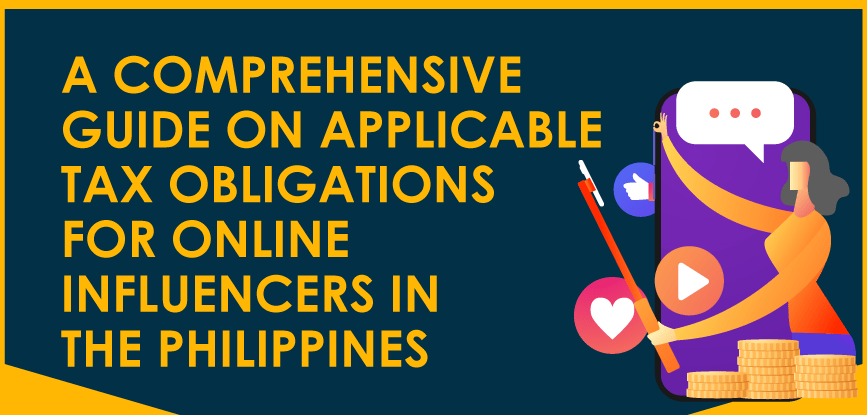
A Comprehensive Guide on Applicable Tax Obligations for Online Influencers in the Philippines [INFOGRAPHIC]
With the rising popularity of online platforms used to earn, transact, and do business, BIR released memorandums to ensure that such individuals comply with relevant tax regulations provided by Philippine law.
To help you, here is everything you need to know about tax obligations for influencers in the Philippines.
![A Comprehensive Guide on Applicable Tax Obligations for Online Influencers in the Philippines [INFOGRAPHIC] A Comprehensive Guide on Applicable Tax Obligations for Online Influencers in the Philippines [INFOGRAPHIC]](https://ahcaccounting.com/wp-content/uploads/2021/12/COMPRE-GUIDE-INLFUENCERS-INFOGRAPH-min.png)
Revenue Memorandum Circular 97-2021
In August 2021, BIR released Revenue Memorandum Circular (RMC) 97-2021 to ensure that online influencers earning through digital platforms comply with tax laws in the Philippines.
RMC 97-2021 defines influencers as:
“All taxpayers, individuals, or corporations, receiving income, in cash or any kind, from any social media sites and platforms (YouTube, Facebook, Instagram, Twitter, TikTok, Reddit, Snapchat, etc.) in exchange for services performed as bloggers, video bloggers or “vloggers” or as an influencer, in general, and from any other activities conducted on such social media sites and platforms.”
Applicable Taxes for Influencers in the Philippines
Under RMC 97-2021, influencers are liable for the following taxes:
- Income Tax. Under Section 5 of the Tax Reform for Acceleration and Inclusion (TRAIN), self-employed and mixed-income earners shall also be liable for income tax.
- Business Tax. There are two different kinds of business taxes in the Philippines, the Percentage Tax and Value-Added Tax (VAT). Influencers with a gross annual income of less than ₱3M are liable for Percentage Tax, while those who earn more than ₱3M are liable for VAT.
Note that BIR categorizes influencers into two groups: self-employed and mixed-earners. The taxes applicable can vary depending on their employment situation.
Allowable Tax Deductions for Influencers
Influencers are generally classified as self-employed individuals, allowing them to claim several deductions on their tax liabilities. The allowed tax deductions are as follows:
For Itemized Deductions:
You can deduct the following expenses from your tax:
- Filming expenses (i.e., cameras, microphones, and other filming equipment)
- Computer equipment
- Subscription and software licensing fees (i.e., Adobe Premiere)
- Internet and communication expenses
- Home office expenses
- Office supplies
- Business expenses such as travel costs related to YouTube business payment to an independent contractor or company for video editing, costume designer, advertising, and marketing costs
- Depreciation expense
- Bank charges and shipping fees
For Optional Standard Deductions:
Influencers can declare 40% of their total income to be dedicated to business expenses.
Double Taxation for Influencers Earning Outside of the Philippines
Influencers who earn income from sources outside the Philippines can apply for a Tax Residency Certificate (TRC) from the BIR International Tax Affairs Division (ITAD) to benefit from tax credits and avoid incurring double taxations.
Secure A Hassle-Free Registration Process with BIR
As online entrepreneurs, it is imperative to ensure that you abide by the latest tax and corporate laws to avoid incurring unwanted penalties and fees from the government. Making sure that you register with appropriate government agencies opens you to numerous business opportunities.



